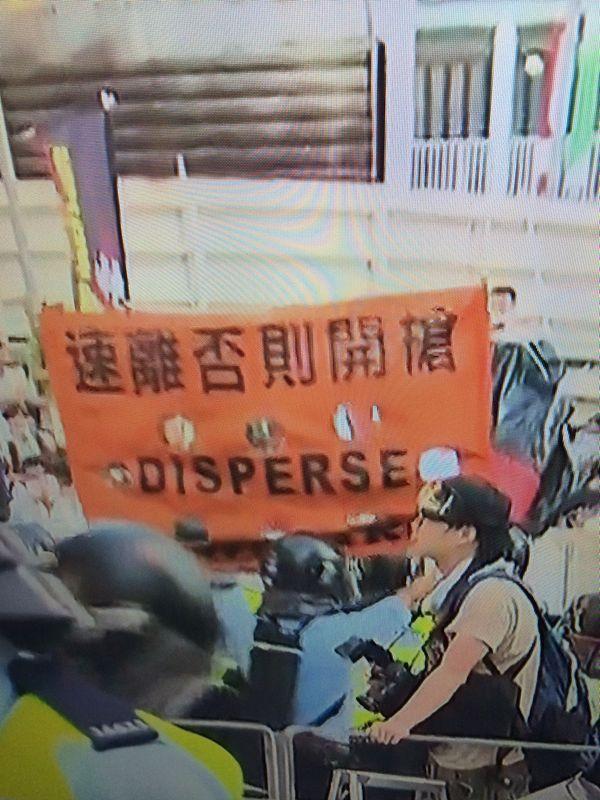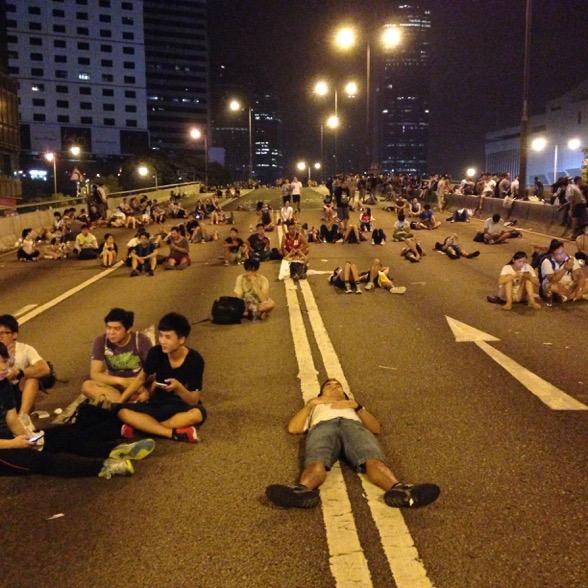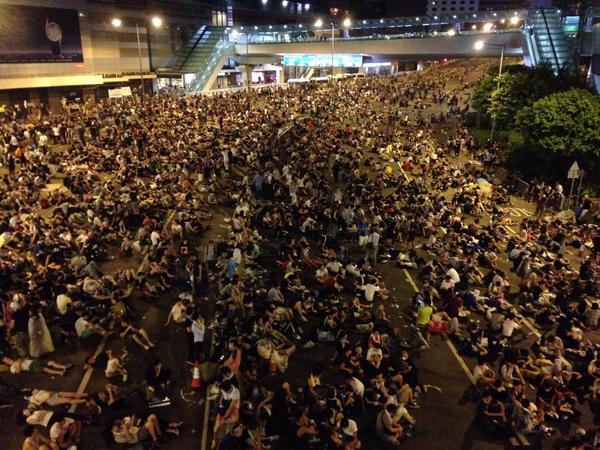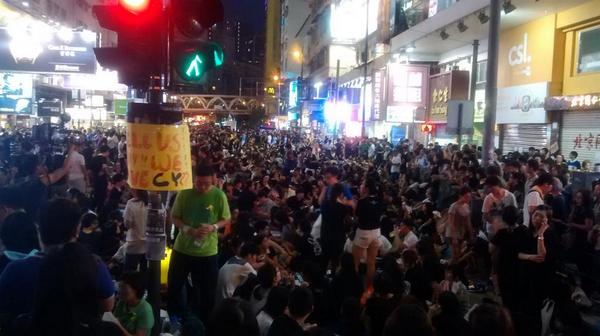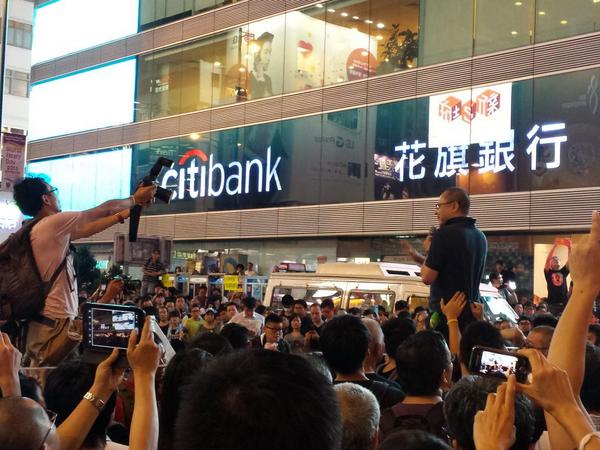China's war on terror becomes all-out attack on Islam in Xinjiang
Ethnic violence in Western China targets Uighurs
The government says ethnic violence that has killed dozens is terrorism. Uighurs claim government oppression.
July 27, 2014 Uighurs (WEE-gurs) wait at a bus stop in old Kashgar in the Xinjiang province of western China. Kevin Frayer/Getty Images
By Simon Denyer September 19 at 7:50 PM
SHACHE COUNTY, China – The month of Ramadan should have been a time of fasting, charity and prayer in China’s Muslim west. But here, in many of the towns and villages of southern Xinjiang, it was a time of fear, repression, and violence.
China’s campaign against separatism and terrorism in its mainly Muslim west has now become an all-out war on conservative Islam, residents here say.
Throughout Ramadan,police intensified a campaign of house-to-house searches, looking for books or clothing that betray “conservative” religious belief among the region’s ethnic Uighurs: women wearing veils were widely detained, and many young men arrested on the slightest pretext, residents say. Students and civil servants were forced to eat instead of fasting, and work or attend classes instead of attending Friday prayers.
The religious repression has bred resentment, and, at times, deadly protests. Reports have emerged of police firing on angry crowds in recent weeks in the towns of Elishku, and Alaqagha; since then, Chinese authorities have imposed a complete blackout on reporting from both locations, even more intense than that already in place across most of Xinjiang.
Chinese police have cracked down on the wearing of beards and veils, in observance of Ramadan, in Muslim-majority Xinjiang province.
A Washington Post team was turned away at the one of several checkpoints around Elishku, as army trucks rumbled past, and was subsequently detained for several hours by informers, police and Communist Party officials for reporting from villages in the surrounding district of Shache county; the following day, the team was again detained in Alaqagha in Kuqa county, and ultimately deported from the region from the nearest airport.
Across Shache county, the Internet has been cut, and text messaging services disabled, while foreigners have been barred. But in snatched conversations, in person and on the telephone, with the few people in the region brave enough to talk, a picture of constant harassment across Xinjiang emerges.
“The police are everywhere,” said one Uighur resident. Another said it was like “living in prison.” Another said his identity card had been checked so many times, “the magnetic strip is not working any more.”
On July 18, hundreds of people gathered outside a government building in the town of Alaqagha, angry about the arrest of two dozen girls and women who had refused to remove their headscarves, according to a report on Washington-based Radio Free Asia (RFA).
Protesters threw stones, bottles and bricks at the building; the police opened fire, killing at least two people, and wounding several more.
Then, on July 28, the last day of Ramadan, a protest in Elishku was met with an even more violent response, RFA reported. Hundreds of Uighurs attacked a police station with knives, axes and sticks; again, the police opened fire, mowing down scores of people.
China's official Xinhua news agency said police killed 59 Uighur “terrorists" in the incident, although other reports suggest the death toll could have been significantly higher.
A veiled Muslim Uyghur woman walks past a statue of Mao Zedong in Kashgar in Xinjiang province. (Kevin Frayer/Getty Images)
According to the Chinese government's version, the angry crowd subsequently went on a rampage in nearby towns and villages, killing 37 civilians — mostly ethnic Han Chinese. The region has been in lockdown ever since, with police and SWAT teams arresting more than 200 people and drones scanning for suspects from the air.
Xinjiang is a land of deserts, oases and mountains, flanked by the Muslim lands of Central Asia. Its Uighur people are culturally more inclined towards Turkey than the rest of China.
China says foreign religious ideas — often propagated over the Internet— have corrupted the people of Xinjiang, promoting fundamentalist Saudi Arabian Wahhabi Islam and turning some of them towards terrorism in pursuit of separatist goals. It also blames a radical Islamist Uighur group — said to be based in Pakistan’s lawless tribal areas and to have links to al-Qaeda — for a recent upsurge in violence. In March, a gruesome knife attack at a train station in the city of Kunming left 33 people dead, while in May, a bomb attack on a street market in Urumqi killed 43 others.
In response, President Xi Jinping has vowed to catch the terrorists “with nets spreading from the earth to the sky,” and to chase them “like rats scurrying across the street, with everybody shouting, ‘Beat them.’ ”
But the nets appear to be also catching many innocent people, residents complain. “You should arrest the bad guys,” said one Uighur professional in Urumqi, “not just anyone who looks suspicious.”
Some 200,000 Communist Party cadres have been dispatched to the countryside, ostensibly to listen to people’s concerns. Yet those officials, who often shelter behind compound walls fortified with alarms and barbed wire, appear to be more interested in ever-more intrusive surveillance of Uighur life, locals say.
In Shache, known in Uighur as Yarkand, an official document boasts of spending more than $2 million to establish a network of informers and surveillance cameras. House-to-house inspections, it says, will identify separatists, terrorists and religious extremists – including women who cover their faces with veils or burqas, and young men with long beards.
In the city of Kashgar, checkpoints enforce what the authorities call “Project Beauty” — beauty, in this case, being an exposed face. A large billboard close to the main mosque carries pictures of women wearing headscarves that pass muster, and those — covering the face or even just the neck — which are banned.
Anyone caught breaking the rules faces the daunting prospect of “regular and irregular inspections,” “educational lectures” and having party cadres assigned as “buddies” to prevent backsliding, the billboard announced. In the city of Karamay, women wearing veils and men with long beards have been banned from public buses.
Terrorism — in the sense of attacks on civilians — is a new phenomenon in Xinjiang, but the unrest here has a much longer history, with many Uighurs chafing under Chinese repression since the Communist Party takeover of the country in 1949, and resentful of the subsequent flood of immigrants from China’s majority Han community into the region.
What has changed is the growth in conservative Islam, and the increasing desperation of Uighurs determined to resist Chinese rule.
Until a decade or two ago, Xinjiang’s Uighurs wore their religion lightly, known more for their singing, dancing and drinking than their observation of the pieties of their faith. But in the past two decades a stricter form of the religion has slowly gained a foothold, as China opened up to the outside world.
While worship was allowed at officially sanctioned — and closely supervised — mosques, a network of underground mosques sprang up. Village elders returning from the Hajj, the annual pilgrimage to Mecca, brought back more conservative ideas; high levels of unemployment among Uighur youth, and widespread discrimination against them, left many searching for new ideas and new directions in life. The rise of Islam was, in part, a reaction against social inequality and modernity.
But Joanne Smith Finley of Britain’s Newcastle University, an expert on Uighur identities and Islam, says religion has become a “symbolic form of resistance” to Chinese rule in a region where other resistance is impossible.
When hopes for independence were cruelly dashed by mass executions and arrests in the city of Ghulja — or Yining in Chinese — in 1997, Uighurs had nowhere else to turn, she said.
“People lost faith in the dream of independence,” she said, “and started looking to Islam instead.”
Not every Uighur in Xinjiang is happy with the rising tide of conservatism: one academic lamented the dramatic decline in Uighur establishments serving alcohol in the city of Hotan, while insisting that many young girls wear veils only out of compulsion.
But China’s clumsy attempts to “liberate” Uighurs from the oppression of conservative Islam are only driving more people into the hands of the fundamentalists, experts say.
“If the government continues to exaggerate extremism in this way, and take inappropriate measures to fix it, it will only force people towards extremism” a prominent Uighur scholar, Ilham Tohti, wrote, before being jailed in January on a charge of inciting separatism.
Xu Yangjingjing contributed to this report.




